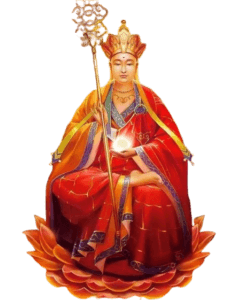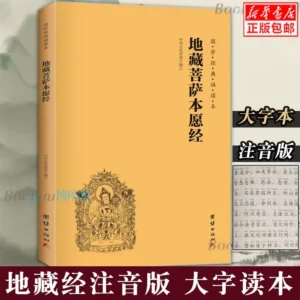Buddhism has many great bodhisattvas, but Ksitigarbha Bodhisattva is renowned for his vow, “As long as there is a single being in hell, I will not attain Buddhahood.” The Ksitigarbha Bodhisattva Sutra (commonly known as the Ksitigarbha Sutra) is an important scripture that reveals the story and vows of Ksitigarbha Bodhisattva. Through this sutra, we gain a deep understanding of his compassion and wisdom, as well as his significant place in Buddhism.

Table of Contents
ToggleThe Meaning of Ksitigarbha’s Name
The name “Ksitigarbha” comes from the Sanskrit word “Kṣitigarbha,” which means “Earth Treasury.” “Earth” symbolizes the qualities of being steadfast and supportive like the ground, while “Treasury” represents the profound and inclusive nature of holding boundless wisdom and treasures. This name reflects Ksitigarbha Bodhisattva’s virtues: he is like the earth, bearing the suffering of all beings, while also holding boundless compassion and wisdom to provide refuge and the path to liberation.
The Past Lives of Ksitigarbha Bodhisattva
The Vow of the Brahmin Woman
According to the Ksitigarbha Sutra, Ksitigarbha Bodhisattva was once a Brahmin woman. Her mother, due to her disbelief in the Three Jewels (Buddha, Dharma, and Sangha), fell into the Avici Hell after death. The Brahmin woman, in order to save her mother, sold all her possessions to support the Buddhist temple and made a great vow in front of the Buddha of the Past, King of Wonderful Adornment: “I vow to use all future eons to set up various means to liberate all suffering beings.” Eventually, her mother and many other sinners in hell were freed. This story demonstrates Ksitigarbha Bodhisattva’s spirit of “great filial piety,” which he expanded into compassion for all beings.
Other Past Life Stories
Ksitigarbha Bodhisattva had many other past lives. He was once the son of a great elder who, upon seeing the majestic appearance of Buddha Lion’s Roar, made a vow to liberate all suffering beings in the six realms. He was also once a king who saw the evil deeds of his people and vowed to save all suffering beings until they all attained enlightenment. These stories show that Ksitigarbha Bodhisattva’s vow has always been consistent: no matter what identity he was in, he always took it as his duty to save all beings.
Kim Gyo-gak and Mount Jiuhua
In Chinese Buddhist tradition, Ksitigarbha Bodhisattva is believed to be the incarnation of Kim Gyo-gak, a royal from Silla. Kim Gyo-gak came to China during the reign of Emperor Xuanzong of Tang and lived in Mount Jiuhua for decades. After his death, his body remained incorrupt, and he was revered as the incarnation of Ksitigarbha Bodhisattva. Mount Jiuhua thus became the bodhimanda (place of practice) of Ksitigarbha Bodhisattva, attracting countless believers to pay homage.

The Image and Symbols of Ksitigarbha Bodhisattva
Ksitigarbha Bodhisattva is usually depicted as a shaven-headed or crown-wearing monastic, wearing kasaya (monastic robes), holding a staff in one hand and a jewel or lotus in the other. The staff symbolizes his wisdom and compassion, which can open the gates of hell and save beings; the jewel represents the light of wisdom, illuminating the path to liberation for all beings. In addition, Ksitigarbha Bodhisattva’s mount is a divine beast named “Diting,” which has the ability to understand Buddhist teachings and ward off evil. This symbolizes the divine power of Ksitigarbha Bodhisattva.
The Vows and Merits of Ksitigarbha Bodhisattva
The Great Vow: “As Long as Hell is Not Empty, I Will Not Become a Buddha”
The most famous vow of Ksitigarbha Bodhisattva is “As long as hell is not empty, I will not become a Buddha; as long as all beings are not liberated, I will not attain enlightenment.” He vowed to save all suffering beings in the six realms, especially those in hell, before attaining Buddhahood. This vow reflects Ksitigarbha Bodhisattva’s boundless compassion and sense of responsibility. He is not afraid of difficulties and delves into the cycle of rebirth to provide salvation and refuge for all beings.
Saving Beings in the Six Realms
Ksitigarbha Bodhisattva’s compassion is not limited to beings in hell. He also widely saves beings in all six realms. He uses different forms and means to save beings in the six realms of hell, hungry ghosts, animals, asuras, humans, and devas. For example, he appears as “Ksitigarbha with a Staff” to save beings in hell, as “Ksitigarbha with a Jewel” to save beings in the hungry ghost realm, and as “Ksitigarbha Removing Obstacles” to help humans eliminate the eight sufferings. This extensive and detailed approach to salvation demonstrates Ksitigarbha Bodhisattva’s wisdom and compassion.
Protection for Practitioners
The Ksitigarbha Sutra mentions that if good men and women recite the name of Ksitigarbha Bodhisattva, or pay homage and make offerings to his image, or even just hear his name, they will gain boundless merit. These merits include never falling into evil realms and being reborn in the Trayastrimsha Heaven a hundred times. Therefore, Ksitigarbha Bodhisattva is regarded as the protector of practitioners. His name and image become an important support for all beings on the path of practice.

The Teachings and Value of the Ksitigarbha Sutra
The Ksitigarbha Sutra is not only a scripture that tells the story of Ksitigarbha Bodhisattva but also contains profound Buddhist teachings. It emphasizes the law of cause and effect, the spirit of filial piety, and the importance of compassionate salvation. By telling the story of Ksitigarbha Bodhisattva’s vows and deeds, this sutra inspires practitioners to generate the mind of enlightenment, actively do good deeds, and save all beings. At the same time, the Ksitigarbha Sutra also provides specific methods of practice and the benefits of merit for practitioners, making it highly practical.
Conclusion: The Inspiration of Ksitigarbha Bodhisattva
Ksitigarbha Bodhisattva, with his great vows, compassion, and wisdom, sets an example for practitioners. His vow “As long as hell is not empty, I will not become a Buddha” makes us deeply feel the bodhisattva’s sense of responsibility and dedication. His spirit of “great filial piety” reminds us to expand our compassion to all beings based on filial piety. His wisdom and skillful means teach us to use the right methods to save all beings. In today’s world, the spirit of Ksitigarbha Bodhisattva still has great practical significance. He reminds us to pay attention to the suffering of others, actively do good deeds, and strive to build a more harmonious and compassionate world.
May we all learn from the spirit of Ksitigarbha Bodhisattva, generate the mind of enlightenment, and follow the bod
